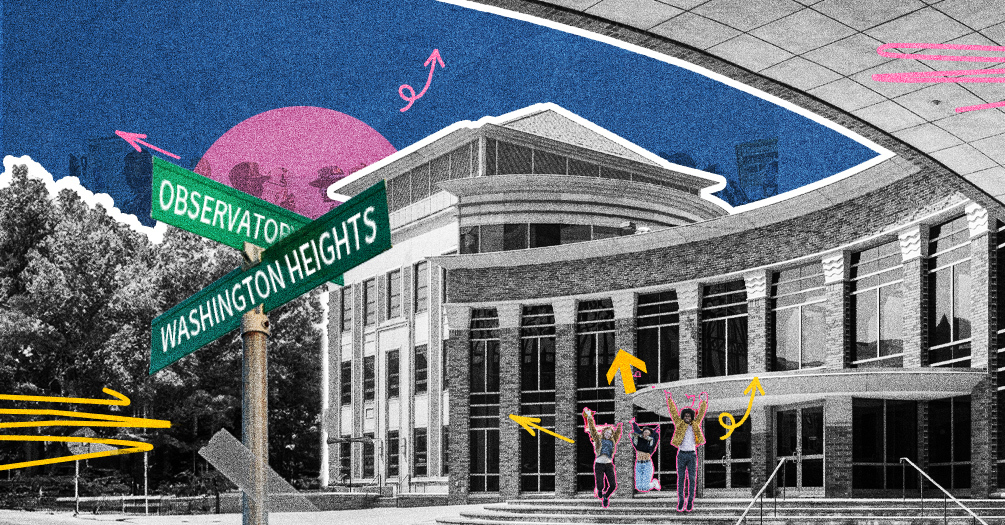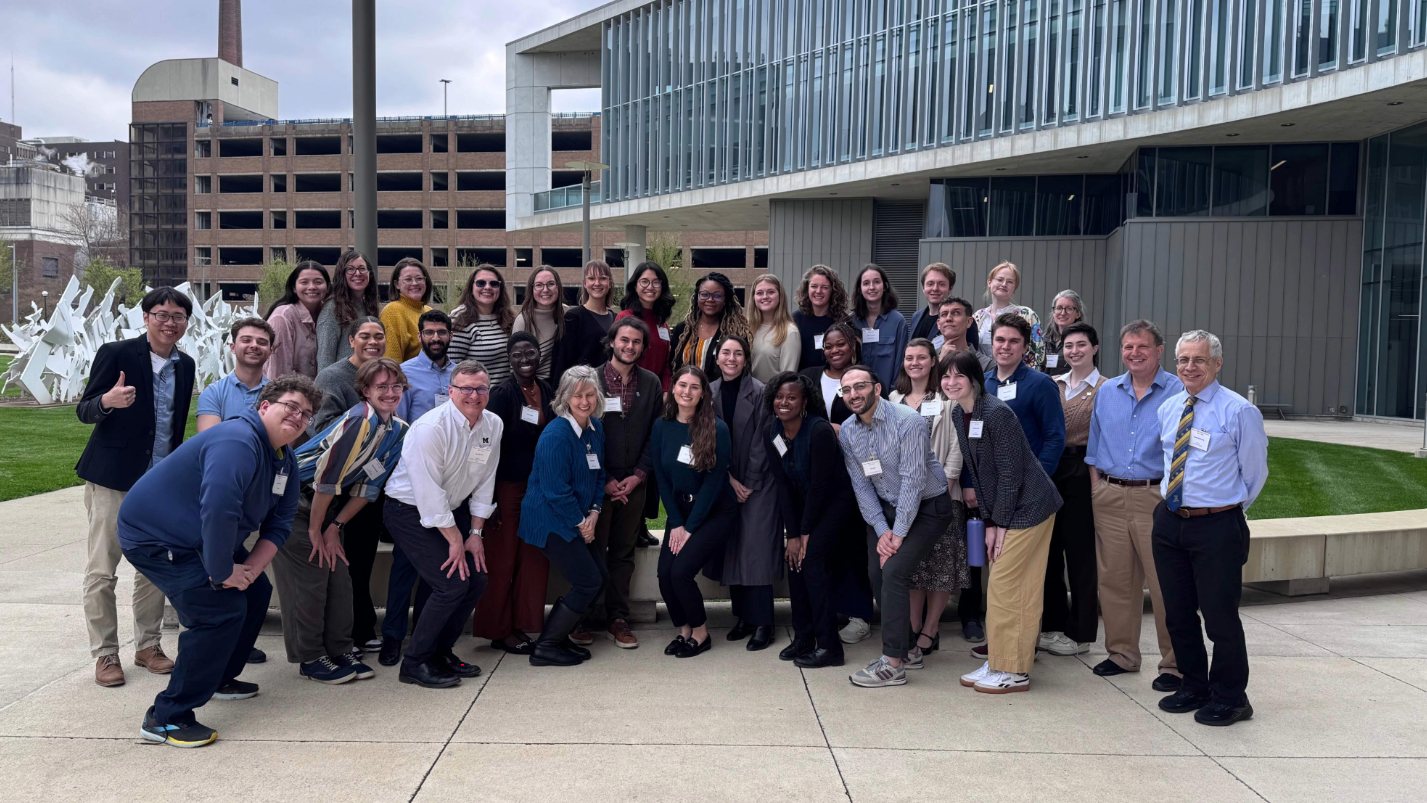On the Heights: April 2025

Stay informed with the latest from the Michigan Public Health community in our monthly digest. Departmental news, research highlights, community achievements, and more to help you stay connected with the Michigan Public Health community. Explore the impactful work of our faculty, students, and partners as we continue to advance public health initiatives and celebrate our collective successes.
Matthew Boulton receives award for scientific excellence in preventive medicine
The American College of Preventive Medicine (ACPM) Board of Regents selected Matthew Boulton as the recipient of their 2025 Scientific Excellence Award. Boulton has authored almost 200 peer-reviewed publications, served as editor-in-chief of the American Journal of Preventive Medicine for the last 12 years, and made lasting contributions as senior editor and contributing author to the 16th edition of Maxcy-Rosenau-Last Public Health and Preventive Medicine, considered the standard text in the field for public health physicians over the last century.
Health Management and Policy professor earns prestigious health economics honor
The American Society of Health Economics recently awarded Edward Norton, UnitedHealthcare Professor of Health Care Management, the Willard G. Manning Memorial Award for the Best Research in Health Econometrics for his contributions to the field. Norton is also a member of the Institute for Healthcare Policy and Innovation and Director of Quantitative Analytics in the Center for Healthcare Outcomes and Policy at the University of Michigan.
Master of Public Health student named M-LEAD Graduate Student of the Year
Esther Hibbs, a second-year master's student in Health Behavior & Health Equity, was named the 2025 University of Michigan Graduate Student of the Year by University of Michigan leadership education program, M-LEAD. The award honors Hibbs' work with the Disability Advocacy Coalition, organizing resources, events, and collaboration opportunities for student groups at the intersection of disability justice and health professions. It also celebrates her work with Services for Students with Disabilities office, including temporary injury case management, coalition building, resource development, and organizing the first-ever SAAS Art Showcase: Celebrating University of Michigan Artists with Disabilities.
Catalyst grants fuel groundbreaking sustainability projects across Michigan and beyond
Two Michigan Public Health faculty have joined sustainability projects that bridge the gap between academic research and real-world impact.
Innovating Sensor Technology for Safer Water
Kate Manz, assistant professor of Environmental Health Sciences
This project aims to develop a sensor that rapidly and selectively identifies PFAS subgroups at levels consistent with EPA standards. Using molecularly imprinted polymers (MIPs) integrated with gold electrodes, the sensor is designed to recognize specific PFAS molecules, enabling detection through electrical signal changes. The sensor will provide a cost-effective, efficient, and more comprehensive solution for water monitoring than current methods.
Confronting Energy Injustice with Community-Driven Solutions
Marie O’Neill, professor of Environmental Health Sciences and Epidemiology
This project, in collaboration with the Energy Equity Project (EEP) and Michigan Environmental Justice Coalition (MEJC), addresses energy shutoffs in Detroit's Black and Latinx communities. To fully understand the impacts of shutoffs, the team will develop a community-driven data tool to track the frequency, duration, and demographic disparities of shutoffs paired with personal narratives of energy poverty. By equipping communities and policymakers with actionable insights, this project aims to strengthen grassroots advocacy, close data gaps, and advance energy justice across Detroit.
Society of Toxicology announces Dana Dolinoy as 2025–2026 Secretary-Elect
The Society of Toxicology (SOT) elected Dana Dolinoy, NSF International Chair of Environmental Health Sciences, to serve as their 2025–2026 Secretary-Elect. Dolinoy’s research integrates the work of toxicologists, epidemiologists, and bioinformaticians to characterize effects of nutritional and environmental factors on the epigenome. She develops precision environmental epigenomics tools for toxicological research and therapeutic communities. Her work particularly focuses on metabolic syndrome, neurodevelopmental disorders, and cancer.
Health Behavior & Health Equity researchers present on Firearm Injury Prevention in Taiwan
Health Behavior & Health Equity professors Hsing-Fang Hsieh and Marc Zimmerman recently presented at the National Taiwan University School of Public Health about school safety and firearm injury prevention from the University of Michigan Institute for Firearm Injury Prevention (IFIP). They emphasized the importance of public health in violence prevention, highlighting that school shootings result from structural issues in mental health, bullying, and relationship management. Across the globe, legislators, researchers, educators, and community members all help create positive, healthy environments for young people.
Student wins Sweetland writing award for public health essay assignment
Michigan Public Health senior Bhaavna Yalavarthi was recently awarded the Excellence in Upper-Level Writing Prize in Social Science in the Sweetland Center for Writing’s annual contest for her essay, "The National School Lunch Program: An Analysis and Recommendations for Improvement."
Yalavarthi wrote the essay as an assignment for PUBHLTH 323: Food Security and Food Assistance in the US, in which students explore the complex set of factors that influence food insecurity in the US, interrogate current approaches to addressing food insecurity, and propose changes to US food policy to improve food security and related outcomes among US households.
“From day one of the course, Bhaavna invested considerable, intentional effort in developing her ideas for her final paper,” said Jennifer Garner, John G. Searle Assistant Professor of Nutritional Sciences and PUBHLTH 323 instructor. “Bhaavna's paper reflects the excellence in writing that can result from proactive and persistent effort in one's academic training. In the current policy and economic environment—wherein school meal programs are being actively debated and food prices are undermining healthy food access at a population level—Bhaavna's paper provides a compelling case for the societal value of investing in free and universal school lunch programming.”
Read more about Yalavarthi on We Are Michigan Public Health
Biostatistics professor elected to the American Association for the Advancement of Science
Arvind Rao, professor of Computational Medicine and Bioinformatics, Radiation Oncology in the Medical School, and Biostatistics at Michigan Public Health, was elected as a fellow for his distinguished contributions to computational medicine, particularly in developing methodologies for the integrative analysis and interpretation of large datasets for improved clinical decision-making.
Michigan Public Health lecturer joins Senate Advisory Committee on University Affairs (SACUA)
Kirsten Herold, a lecturer at Michigan Public Health, will serve a three-year term on the executive committee of the University of Michigan’s central faculty governance system starting May 1. As outgoing president of the Lecturers’ Employment Organization, a union for non-tenure faculty, Herold believes faculty governance must move toward a more collaborative approach with the administration.
“With all the work I’ve done, I have become convinced that representation, whether it’s through collective bargaining and union representation or through faculty governance is not just in the interest of whoever is being represented, it is in all our interest. We really are a much better, stronger place when all the voices are heard,” she said.

COHSE trainees and faculty attend regional occupational health and safety symposium
The University of Michigan Center for Occupational Health and Safety Engineering organized a trip to Cincinnati for a symposium titled "Legal, Policy, and Advocacy Aspects of Occupational Safety and Health." Over 30 University of Michigan faculty, postdocs, staff, and students attended this symposium in mid-April, along with other university programs from Ohio, Illinois, and Kentucky.
From classroom to crisis zone, students learn realities of humanitarian work
The Center for Global Health Equity at the University of Michigan, in collaboration with the School of Public Health, recently co-sponsored an immersive spring break workshop to introduce students to the humanitarian response sector. Titled PH 567: Operational Aspects of International Disaster Relief, the workshop drew 27 students from diverse disciplines, including public health, public policy, social work, and environmental studies.
The workshop was designed to provide a candid and realistic view of the challenges and complexities of humanitarian work and was co-led by three facilitators, each bringing unique perspectives from nursing and humanitarian leadership, public health, and medicine.
“This course gave me a unique opportunity to gain an in-depth understanding of the humanitarian system, the cluster system, and the complex process involved in deploying culturally appropriate and evidence-based humanitarian responses,” said Isabel Gilbertson, a Master of Public Health student specializing in global health epidemiology. “I greatly valued and appreciated the ability to learn from the instructors and hear about their field experiences and professional journeys.”
